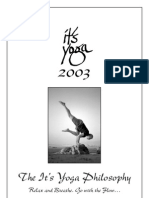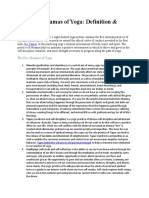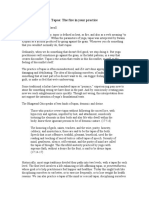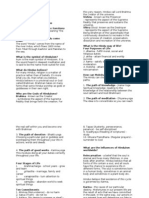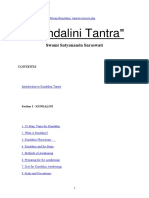Svadhyaya - Self-Study
Svadhyaya - Self-Study
Uploaded by
Nagy OrsolyaCopyright:
Available Formats
Svadhyaya - Self-Study
Svadhyaya - Self-Study
Uploaded by
Nagy OrsolyaOriginal Description:
Original Title
Copyright
Available Formats
Share this document
Did you find this document useful?
Is this content inappropriate?
Copyright:
Available Formats
Svadhyaya - Self-Study
Svadhyaya - Self-Study
Uploaded by
Nagy OrsolyaCopyright:
Available Formats
“Honor the wisdom of those who have come before you.
Learn to listen to the wisdom inside your own being.”
Colleen & Rodney Yee
SUTRA TALK with Jocelyn Gordon
SVADHYAYA - SELF-STUDY
The Yoga Sutra Of Patanjali is a collection of 196 sutras
Yamas & Niyamas are ethical guidelines included in the eight-fold path leading to liberation.
Yamas are things not to do > restraints/self-regulating; Niyamas are are things to do > observances as habits for
healthy living, spiritual enlightenment and liberated state of existence (wikipedia)
What are the Yamas
1. Ahimsa > nonviolence
2. Satya > truthfulness
3. Asteya > non-stealing
4. Brahmacharya > non-excess
5. Aparigraha > non-possessivenes/non-greediness
What are the Niyamas
1. Saucha > purity
2. Santosha > contentment
3. Tapas > self-discipline and effort
4. Svadhyaya > self-study
5. Ishvara Pranidhana > surrender (to the Divine/God)
The fourth Niyama - SVADHYAYA
Svadhyaya ::: Self-Study
Additional translations:
Svadhyaya means the study of ancient texts, as well as the study of oneself
Svādhyāya is a compound Sanskrit word composed of svā ( वा) + adhyāya (अ याय). Adhyāya means "a lesson,
lecture, chapter; reading". Svā means "own, one's own, self, the human soul".[8] Therefore, Svādhyāya literally means
"one's own reading, lesson". M onier-Williams' Sanskrit-English Dictionary, Cologne Digital Sanskrit Lexicon, Germany
Compiled by Jocelyn Gordon, Creator of HoopYogini
www.HoopYogini.com | www.JocelynGordon.com
Cultural Connections on Svadhyaya:
Self-Reflection | Sankofa (West Africa) “learning from the past”
“Sankofa” teaches us that we must go back to our roots in order to move forward. That is, we should reach back and
gather the best of what our past has to teach us, so that we can achieve our full potential as we move forward.
Whatever we have lost, forgotten, forgone, or been stripped of can be reclaimed, revived, preserved, and
perpetuated. https://www.uis.edu/africanamericanstudies/students/sankofa/
Kaizen (Constant improvement)
Kaizen - Japanese concept for organizational improvement
“small actions reap large rewaDon't accept the obvious issue; instead, ask "why" five times to get to the root cause.
What Is The Sutra?
SUTRA
2.44 From self-study and reflection on sacred words (svadhyaya), one attains contact, communion, or concert with
that underlying natural reality or force.
(svadhyayat ishta devata samprayogah)
www.swamij.com
II.44, recommends Svadhyaya as follows
वा याया द टदे वतासं योगः॥
Study thy self, discover the divine.
— Patanjali’s Yogasutra, II.44
Questions for the journey:
1. How do I start my day? With social media and outer engagement? How can I create an effective
morning ritual of stillness, prayer and gratitude?
2. How do I complete my day? What are my nightly rituals? How can I create time for reflection,
gratitude, forgiveness and refinement (“Day In Review”/.)? How can I encourage my children to
reflect and refine (thorns & roses)?
3. How often do I seek outside validation? What are my inner sensations of alignment and
“rightness?
4. What spiritual texts call me? When was the last time I opened a wisdom text, found a chapter or
verse and meditated on the illumination?
5. Who are my chosen dieties and spiritual guides - Jesus, Krishna, Allah - what of their words can be
guideposts for my daily life?
6. Who are the truth tellers in my life? Do I need a coach, therapist, healer for deeper support as I
purify and return to my divine essence?
7. What lessons have been repeatedly reflected to me in my life time? What have I repeatedly needed
to learn? How can I make my life easier and more effective?
8. How is my life flowing? What is the quality of my relationships? How can I improve my
circumstances? How can I develop my character?
Compiled by Jocelyn Gordon, Creator of HoopYogini
www.HoopYogini.com | www.JocelynGordon.com
Integrate SVADHYAYA in your Hatha Yoga and HoopYogini practice:
● observe your breath
● practice ahimsa via deep listening to and observation of your body; note sensation and become aware of
your day to day, every shifting edge - the point where you feel engaged and challenged. If you stay away
from your edge or move over your edge, you may notice that you daydream, you may disassociate and
loose sense of place and body
● Infuse your practice with mantra, healing music / sounds, prayer, poetry (Rumi) and scripture
● infuse some of the questions above into your practice and classes
● keep a journal to note your experiences in asana, pranayama, and meditation
● give yourself and your students options and modifications
● for yoga teachers and trainees, I suggest bringing a journal to yoga classes, noting your experience and
reactions to certain asanas and how they are presented; it is also helpful to write what you enjoyed about
the teacher’s way of being, what you would like to adopt from that style and how you would improve on the
facilitation
● for those wanting to improve their health, keep a food journal for at least three days. Document everything
you eat and how you feel after.
● do your practice and move through the koshas so you remove the veils to the anandamaya kosha and inner
spirit… so you can reveal your divine nature
Go Deeper! Transform Lives! Have Fun!
Join Our Teacher Training
Details Here!
Compiled by Jocelyn Gordon, Creator of HoopYogini
www.HoopYogini.com | www.JocelynGordon.com
You might also like
- Success and the Spirit: An Aquarian Path to AbundanceFrom EverandSuccess and the Spirit: An Aquarian Path to AbundanceRating: 5 out of 5 stars5/5 (1)
- Mastery of the True Self: The Discipline of Love Through Sadhana, Aradhana and PrabhupatiFrom EverandMastery of the True Self: The Discipline of Love Through Sadhana, Aradhana and PrabhupatiNo ratings yet
- Fourteen Lessons On Raja Yoga PDFDocument132 pagesFourteen Lessons On Raja Yoga PDFVineet100% (2)
- Secrets of Yogic Breathing: Vayu Siddhi: A Guide to Pranayama, Ashtanga Yoga's Fourth LimbFrom EverandSecrets of Yogic Breathing: Vayu Siddhi: A Guide to Pranayama, Ashtanga Yoga's Fourth LimbRating: 4.5 out of 5 stars4.5/5 (2)
- The Chakras: Kundalini Yoga as taught by Yogi BhajanFrom EverandThe Chakras: Kundalini Yoga as taught by Yogi BhajanRating: 5 out of 5 stars5/5 (1)
- Lighting the Lamp of Wisdom: A Week Inside a Yoga AshramFrom EverandLighting the Lamp of Wisdom: A Week Inside a Yoga AshramRating: 5 out of 5 stars5/5 (1)
- Introduction To Yoga: Retreat Handbook 2017Document43 pagesIntroduction To Yoga: Retreat Handbook 2017Chhoti Gas serviceNo ratings yet
- It's Yoga Philosophy (2003) - Larry Schultz and Reema DattaDocument16 pagesIt's Yoga Philosophy (2003) - Larry Schultz and Reema Dattavaraprasad119100% (1)
- The Meditation Process: Raja Yoga and Buddhist ShamathaFrom EverandThe Meditation Process: Raja Yoga and Buddhist ShamathaRating: 3 out of 5 stars3/5 (2)
- Yoga for Women: Gain Strength and Flexibility, Ease PMS Symptoms, Relieve Stress, Stay Fit Through Pregnancy, Age GracefullyFrom EverandYoga for Women: Gain Strength and Flexibility, Ease PMS Symptoms, Relieve Stress, Stay Fit Through Pregnancy, Age GracefullyNo ratings yet
- The Five Niyamas of Yoga - Definition & Practice TipsDocument3 pagesThe Five Niyamas of Yoga - Definition & Practice Tipspassion26No ratings yet
- Philosophical Foundation of YogaDocument30 pagesPhilosophical Foundation of YogaAtu Kaushal100% (1)
- The Power of Relaxation: Align Your Body, Your Mind, and Your Life Through MeditationFrom EverandThe Power of Relaxation: Align Your Body, Your Mind, and Your Life Through MeditationNo ratings yet
- Flow YogDocument43 pagesFlow YogTushar SavaliyaNo ratings yet
- Meditation: The Skills, Practices and Guided Meditation ScriptsFrom EverandMeditation: The Skills, Practices and Guided Meditation ScriptsRating: 4.5 out of 5 stars4.5/5 (2)
- 10 MeditationsDocument63 pages10 MeditationsSaaZic100% (2)
- Art of Introspection - EnglishDocument5 pagesArt of Introspection - Englishlarst06No ratings yet
- Awakening Presence - A Journey To Mindfulness and Inner BalanceDocument12 pagesAwakening Presence - A Journey To Mindfulness and Inner BalanceantoinetteqwilliamsNo ratings yet
- TapasDocument3 pagesTapasAlex RiveraNo ratings yet
- Holistic Life-2014Document68 pagesHolistic Life-2014bharat jaiswalNo ratings yet
- Lessons in Meditation: Based on the Teachings of Paramhansa Yogananda, and His Direct Disciple, Swami KriyanandaFrom EverandLessons in Meditation: Based on the Teachings of Paramhansa Yogananda, and His Direct Disciple, Swami KriyanandaNo ratings yet
- Asian Thoughts HandoutDocument22 pagesAsian Thoughts HandoutKrish BehappyNo ratings yet
- Mantra: Personal Guidance through the Power of the WordFrom EverandMantra: Personal Guidance through the Power of the WordRating: 5 out of 5 stars5/5 (1)
- Yoga - Basic Theory: Personal View. Its Readers Liberty To Study, Think, Believe or Accept The FactsDocument33 pagesYoga - Basic Theory: Personal View. Its Readers Liberty To Study, Think, Believe or Accept The FactsGopi RamalingamNo ratings yet
- Urban Meditation Skills: How to be a Happy MeditatorFrom EverandUrban Meditation Skills: How to be a Happy MeditatorNo ratings yet
- Shanti Yoga Ashram Asana BookDocument471 pagesShanti Yoga Ashram Asana BookLisanne Wille100% (2)
- Yoga and TypesDocument25 pagesYoga and TypesPranali M.No ratings yet
- The Yoga-Body Cleanse: A 7-Day Ayurvedic Detox to Rejuvenate Your Body and Calm Your MindFrom EverandThe Yoga-Body Cleanse: A 7-Day Ayurvedic Detox to Rejuvenate Your Body and Calm Your MindNo ratings yet
- Understanding the Inner Mind: Achieve an Accomplished Life by Managing Your Thoughts with the Help of “Thought Flow Diagram”From EverandUnderstanding the Inner Mind: Achieve an Accomplished Life by Managing Your Thoughts with the Help of “Thought Flow Diagram”Rating: 4 out of 5 stars4/5 (1)
- Summary of Practices WitnessingDocument87 pagesSummary of Practices Witnessingश्री ऋजुNo ratings yet
- Q1. Gayatri Mantra - Its MeaningDocument11 pagesQ1. Gayatri Mantra - Its MeaningDuggal ShikhaNo ratings yet
- The Four Paths of Yoga: Yoga, To Think Is Gyana Yoga, To Feel (Love) Is Bhakti Yoga, and To Do NothingDocument6 pagesThe Four Paths of Yoga: Yoga, To Think Is Gyana Yoga, To Feel (Love) Is Bhakti Yoga, and To Do NothingizzybjNo ratings yet
- Yoga Manual1 PDFDocument38 pagesYoga Manual1 PDFpradeepscribd_SCRIBD100% (1)
- Sitting Comfortably: Preparing the Mind and Body for Peaceful MeditationFrom EverandSitting Comfortably: Preparing the Mind and Body for Peaceful MeditationNo ratings yet
- Kundalini Tantra by Swami Satyananda SaraswatiDocument409 pagesKundalini Tantra by Swami Satyananda SaraswatiIshika Tiwari100% (2)
- Introduction To Yoga and Yogic Practices IgnouDocument17 pagesIntroduction To Yoga and Yogic Practices IgnouDarshan GowdilluNo ratings yet
- Beginers HandoutDocument4 pagesBeginers HandoutpunmaNo ratings yet
- Yoga and MeditationDocument32 pagesYoga and Meditationshri lakshmiNo ratings yet
- Yoga for Beginners: Kundalini Yoga: With the Convenience of Doing Kundalini Yoga at Home!!From EverandYoga for Beginners: Kundalini Yoga: With the Convenience of Doing Kundalini Yoga at Home!!No ratings yet
- Yoga Education IDocument12 pagesYoga Education IAlmost ChristinaNo ratings yet
- Total Yoga For You: A Step-by-step Guide to Yoga at Home for EverybodyFrom EverandTotal Yoga For You: A Step-by-step Guide to Yoga at Home for EverybodyNo ratings yet
- Yoga: Your Home Practice CompanionFrom EverandYoga: Your Home Practice CompanionRating: 4 out of 5 stars4/5 (8)
- Effortless Mind: Meditate with Ease Calm Your Mind, Connect with Your Heart, and Revitalize Your LifeFrom EverandEffortless Mind: Meditate with Ease Calm Your Mind, Connect with Your Heart, and Revitalize Your LifeRating: 5 out of 5 stars5/5 (1)
- Increasing Internal Energy: How to Invigorate Your Daily Life and Enhance Your Yoga PracticeFrom EverandIncreasing Internal Energy: How to Invigorate Your Daily Life and Enhance Your Yoga PracticeNo ratings yet







